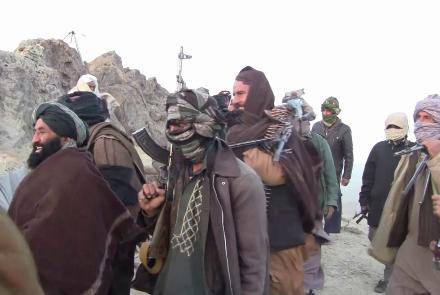
Taliban terrorists captured another Afghan city bringing total to ten
The Taliban has taken yet another city from beleaguered and bloodied Afghan forces as the Islamists slowly tighten the noose on the capital Kabul.
Ghazni, capital of a province that bears the same name, was the latest to fall – with Taliban fighters filming themselves strolling through the city centre on Thursday morning. ‘Large numbers of soldiers were killed and dozens more surrendered,’ a Taliban spokesman said.
The city is located just 80 miles south of the capital Kabul and straddles the main road heading south. The Taliban already controls the main highway heading north after capturing Pul-e Khumri earlier this week, meaning the two main routes into and out of the city are now effectively closed.
Meanwhile fighting has ramped up in Lashkar Gah, capital of Helmand province, and Kandahar, capital of Kandahar province, which appear on the brink of falling into Taliban hands.
The Taliban is now thought to control two thirds of the country, with the government in retreat in almost every region except Kabul – which is one of the only cities not yet under direct attack.
The jihadists said Lashkar Gah briefly fell into their hands on Wednesday, but later revised to say that fighting is still ongoing and the city is not fully under their control.
A huge IED exploded near the main police headquarters yesterday, sending a plume of smoke into the sky and partially destroying the outer walls – allowing Taliban fighters to stream inside.
However, it is thought that some of the government troops holed up there managed to escape the slaughter and made it to the governor’s office, where they have resumed their fight.
Nasima Niazi, a lawmaker from Helmand. said she believed the Taliban attack killed and wounded security force members, but she had no casualty breakdown.
Another suicide car bombing targeted the provincial prison, but the government still held it, she said.
In Kandahar, the Taliban claimed to have captured the city’s prison on Wednesday, freeing ‘hundreds’ of inmates which including some of its own fighters, who have now rejoined the ranks as reinforcements.
The loss of the jail is an ominous sign for government forces defending the city, which has been besieged for weeks by an assault that shows no sign of letting up.
Afghan security forces and the government have not responded to repeated requests for comment over the days of fighting.
However, President Ashraf Ghani is trying to rally a counteroffensive relying on his country’s special forces, the militias of warlords and American airpower ahead of the U.S. and NATO withdrawal at the end of the month.
He was in the city of Mazar-i-Sharif, in the country’s traditionally anti-Taliban northern strongholds, on Wednesday in an attempt to rally his men as jihadists approached its outskirts with a major offensive expected soon.
While Kabul itself has not been directly threatened in the advance, the stunning speed of the offensive raises questions of how long the Afghan government can maintain control of the slivers of the country it has left.
The government may eventually be forced to pull back to defend the capital and just a few other cities as thousands displaced by the fighting fled to Kabul and now live in open fields and parks.
With the Afghan air power limited and in disarray, the U.S. Air Force is believed to be carrying out some series of strikes to support Afghan forces.
Aviation tracking data suggested U.S. Air Force B-52 bombers, F-15 fighter jets, drones and other aircraft were involved in the fighting overnight across the country, according to Australia-based security firm The Cavell Group.
It’s unclear what casualties the U.S. bombing campaign has caused. The U.S. Air Force’s Central Command, based in Qatar, did not immediately respond to a request for comment Thursday.
The success of the Taliban offensive also calls into question whether they would ever rejoin long-stalled peace talks in Qatar aimed at moving Afghanistan toward an inclusive interim administration as the West hoped.
Instead, the Taliban appears to aim to seize power by force – or the country could splinter into factional fighting like it did after the Soviet withdrawal in 1989.
In Doha, U.S. envoy Zalmay Khalilzad has met with diplomats from China, Pakistan and Russia in an effort to as a group warn the Taliban they could again be considered international pariahs if they continue their offensive, State Department spokesman Ned Price said.
Khalizad also plans to meet with Afghan government and Taliban officials as the fighting goes on without a sign of it abating.
The multiple battle fronts have stretched the government’s special operations forces – while regular troops have often fled the battlefield – and the violence has pushed thousands of civilians to seek safety in the capital.
The latest U.S. military intelligence assessment is that Kabul could come under insurgent pressure within 30 days and that if current trends hold, the Taliban could gain full control of the country within a couple of months.
Source: Daily Mail





